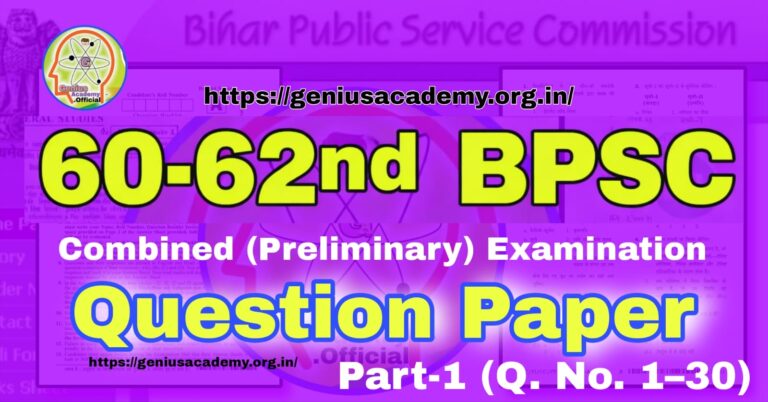Secularism : Supreme Court Upholds the Inclusion of ‘Socialist’ and ‘Secular’ in the Preamble: A Detailed Analysis
The Supreme Court of India recently delivered a landmark ruling reaffirming the inclusion of the terms socialist and secular in the Preamble of the Constitution. This decision carries immense significance for India’s constitutional philosophy and reflects the enduring values of the nation as a democratic and inclusive society.
Background of the Case
The case stemmed from a series of petitions filed in 2020 challenging the validity of the insertion of the words socialist and secular into the Preamble through the 42nd Constitutional Amendment Act, 1976. These petitions raised several issues:
- Retrospective Application: Petitioners argued that the terms were inserted with retrospective effect, which they claimed was not permissible.
- Impact on Founding Principles: Some contended that the amendment altered the original intent and philosophy of the Constitution as envisaged by the framers.
Despite these arguments, the Supreme Court upheld the constitutional validity of the amendment, emphasizing the enduring relevance of these principles.
Supreme Court’s Ruling
1. Interpretation of ‘Socialist’ and ‘Secular’:
- Socialist:— The Court noted that socialism in the Indian context implies eliminating all forms of exploitation—social, political, or economic. It symbolizes the nation’s commitment to equitable distribution of resources.
- Secular:— Secularism denotes equal respect and treatment of all religions by the state, ensuring impartial governance free from religious bias.
2. Preamble as an Integral Part of the Constitution:
- The Court reiterated the landmark Kesavananda Bharati case (1973) ruling, which recognized the Preamble as a part of the Constitution. It serves as a guiding light to interpret the Constitution’s objectives.
3. Dynamic Constitution:
- Declaring the Constitution as a “living document,” the Court emphasized its capacity to evolve in response to societal needs. Amendments like the 42nd Amendment reflect this adaptability, ensuring the Constitution remains relevant.
Historical Context: Inclusion of Socialist and Secular
42nd Amendment Act, 1976
- Enacted during the Emergency period, the 42nd Amendment sought to strengthen the ideological framework of the Indian state.
- It added the words socialist and secular to the Preamble, explicitly affirming the state’s commitment to socialism and secularism.
- Critics have often associated this amendment with authoritarian overreach, given its Emergency-era origins, but its principles align with India’s socio-political ethos.
Debate During Constitution Drafting
- The terms socialist and secular were not included in the original Preamble but were implicit in the Constitution’s framework, reflected in provisions like Articles 14 (Equality before Law), 15 (Prohibition of Discrimination), and 25–28 (Religious Freedoms).
- The framers debated but avoided explicit inclusion of these terms, believing the Constitution’s spirit inherently embraced these values.
Constitutional Philosophy: Secularism
Secular Ethos in India
- Secularism is not just a Western concept but has deep roots in Indian civilization, which has historically embraced pluralism and coexistence.
- Indian secularism differs from its Western counterpart:
- Western Secularism:— Advocates complete separation of religion and state.
- Indian Secularism:— Promotes equal respect and treatment of all religions, ensuring freedom of religion without state interference.
Constitutional Provisions Supporting Secularism:
- Article 14:— Ensures equality before the law.
- Article 15:— Prohibits discrimination on grounds of religion, race, caste, sex, or place of birth.
- Articles 25–28:— Guarantee freedom of religion, prohibit religious instruction in state-funded educational institutions, and ensure religious autonomy.
Supreme Court’s Role in Strengthening Secularism:
- Landmark judgments such as the S.R. Bommai case (1994) and Kesavananda Bharati case have reinforced secularism as part of the basic structure of the Constitution.
- The Court has repeatedly underscored that secularism is foundational to India’s democratic fabric.
Constitutional Philosophy: Socialism
Origins of Socialism in India
- Socialism in India has its roots in the freedom struggle, where leaders like Jawaharlal Nehru and Subhas Chandra Bose advocated state-driven industrialization and welfare policies to bridge social and economic inequalities.
Key Developments in Socialist Policies
1. Nehruvian Model:
- Focused on planned economic development and public sector-led industrialization.
- Established key public sector undertakings (PSUs) to spearhead economic growth.
2. Land Reforms:
- Implemented to dismantle feudal structures and ensure equitable land distribution.
- Addressed rural poverty and aimed to empower marginalized farmers.
3. Social Justice Movements:
- Affirmative action policies, such as reservations for Scheduled Castes (SCs), Scheduled Tribes (STs), and Other Backward Classes (OBCs), were introduced to promote inclusivity.
Constitutional Provisions Reflecting Socialism:
- Directive Principles of State Policy (DPSPs):
- Articles 38 and 39 emphasize the state’s role in ensuring equitable distribution of resources and reducing inequalities.
- Article 43: Encourages the establishment of a welfare state.
Challenges to Secularism and Socialism
Secularism
1. Religious Polarization:
- Rising communal tensions and political exploitation of religion pose challenges to secular principles.
- Ensuring impartial state policies in a diverse society remains a complex task.
2. Judicial Interpretations:
- Courts occasionally face criticism for inconsistent rulings on matters involving religious practices.
Socialism
1. Economic Disparities:
- Despite socialist policies, income and wealth inequalities persist in India.
2. Privatization and Liberalization:
- Economic reforms since 1991 have shifted focus toward market-driven growth, often perceived as a departure from socialist ideals.
3. Implementation Challenges:
- Land reforms and welfare policies have faced hurdles due to administrative inefficiencies and vested interests.
Impact of the Supreme Court’s Ruling
1. Reaffirmation of Constitutional Principles:
- The decision underscores India’s commitment to equality, justice, and inclusivity.
- It solidifies the foundational ethos of the nation, ensuring that the Constitution reflects the aspirations of a diverse society.
2. Guidance for Policymakers:
- By upholding socialist and secular ideals, the ruling provides a moral compass for policymakers to frame inclusive and equitable policies.
3. Protection of the Basic Structure Doctrine:
- The judgment reiterates that core constitutional values, such as secularism and socialism, are non-negotiable and must be preserved.
Lessons from Global Perspectives
India’s approach to secularism and socialism offers valuable lessons to other nations:
- Adaptability:— The integration of secular and socialist principles demonstrates how constitutional frameworks can evolve to meet societal needs.
- Pluralism:— Indian secularism’s emphasis on coexistence serves as a model for managing diversity.
- Balanced Development:— Socialist policies underscore the importance of state intervention to address inequalities.
Concluding Remarks
The Supreme Court’s decision to uphold the inclusion of socialist and secular in the Preamble reaffirms the Constitution’s dynamic nature. These principles are not mere theoretical constructs but foundational pillars that define India’s identity as a democratic republic committed to justice, equality, and inclusivity.
This ruling serves as a reminder of the Constitution’s enduring relevance and adaptability, ensuring it remains a living document that evolves in harmony with the needs and aspirations of the people. By strengthening the vision of a secular and socialist India, the Supreme Court has reaffirmed the nation’s commitment to safeguarding its pluralistic and egalitarian ethos for future generations.
Daily Mains Practice Questions
UPSC (CSE) Mains Questions on the Supreme Court’s Ruling on the Preamble
General Studies Paper II: Polity and Constitution
| [Q1.] Discuss the significance of the terms socialist and secular in the Preamble of the Indian Constitution. How do these principles influence governance in India? (250 words) |
| [Q2.] Evaluate the Supreme Court’s interpretation of the Preamble as an integral part of the Constitution and its relevance in modern Indian society. (250 words) |
| [Q3.] Analyze the evolution of secularism in India, focusing on its constitutional and judicial interpretations. How does Indian secularism differ from its Western counterpart? (250 words) |
| [Q4.] “The inclusion of ‘socialist’ and ‘secular’ in the Preamble reflects India’s socio-political ethos.” Critically analyze this statement in light of the Supreme Court’s recent ruling. (250 words) |
| [Q5.] Examine the role of the Directive Principles of State Policy (DPSPs) in advancing the ideals of socialism in India. Highlight key challenges in achieving these goals. (250 words) |
| [Q6.] In what ways does the Preamble act as a guiding light for interpreting the Constitution? Discuss with examples from judicial precedents.(250 words) |
| [Q7.] How does the Supreme Court’s recent affirmation of the terms socialist and secular contribute to strengthening India’s constitutional ethos in the 21st century? (250 words) |
| [Q8.] Discuss the relevance of the basic structure doctrine in safeguarding secularism and socialism in contemporary India. (250 words) |
Frequently Asked Questions (FAQs) on Secularism : Inclusion of ‘Socialist’ and ‘Secular’ in the Preamble in 1976
1. What is the significance of the Preamble in the Indian Constitution?
Answer:—
The Preamble serves as an introduction to the Constitution, outlining its fundamental values and guiding principles. It reflects the essence of the Constitution and provides a framework for interpreting its provisions.
Answer:—
The terms were added through the 42nd Constitutional Amendment Act, 1976, during the Emergency period. Their inclusion explicitly reaffirmed India’s commitment to socialism (equitable distribution of resources) and secularism (equal respect for all religions).
3. What does the term secular mean in the Indian context?
Answer:—
Indian secularism ensures equal respect for all religions while maintaining state neutrality in religious matters. Unlike Western secularism, it does not advocate a complete separation of religion and state but emphasizes religious harmony and coexistence.
Answer:—
Socialism in the Indian context refers to state-led economic planning, equitable resource distribution, and social justice. It aims to eliminate exploitation and promote welfare through land reforms, affirmative action, and public sector initiatives.
5. How does the Supreme Court interpret the Preamble?
Answer:—
The Supreme Court has consistently held that the Preamble is an integral part of the Constitution. It serves as a guiding light for interpreting constitutional provisions and represents the aspirations of the people.
6. What is the Basic Structure Doctrine?
Answer:—
The Basic Structure Doctrine, established in the Kesavananda Bharati case (1973), ensures that certain core principles, including secularism and socialism, cannot be amended or destroyed by Parliament.
7. How does secularism strengthen Indian democracy?
Answer:—
Secularism promotes inclusivity and safeguards individual freedoms by ensuring that the state treats all religions equally. It fosters harmony in a diverse society, reinforcing democratic values.
Answer:—
Despite economic liberalization, socialism remains relevant for addressing persistent inequalities and ensuring social justice. Policies like affirmative action, welfare schemes, and land reforms continue to reflect its importance.
9. How does the 42nd Amendment affect the Constitution?
Answer:—
The 42nd Amendment is often called the “mini-Constitution” because it made extensive changes, including the explicit inclusion of socialist and secular in the Preamble. It reinforced the state’s commitment to equality, justice, and inclusivity.
Answer:—
- Secularism: Religious polarization, inconsistent judicial rulings, and politicization of religion challenge its implementation.
- Socialism: Economic disparities, privatization, and administrative inefficiencies hinder its effective realization.







